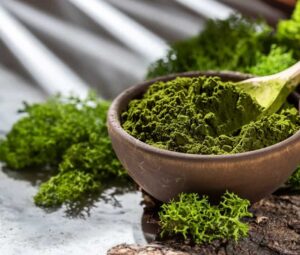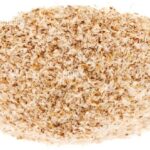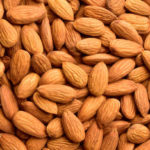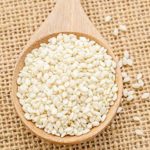Dear Readers, Whether it’s a vitamin bomb, a fitness aid, or a detox miracle, the freshwater algae chlorella is said to have many effects. But how healthy is the algae?
Below you will find out everything you need to know about chlorella, from effects to risks
What is Chlorella Algae?
Chlorella is a genus of algae.
The algae consist of spherical single-celled organisms that reproduce through cell division.
They have a strong green color due to the plant pigment chlorophyll. Due to its small size, chlorella is also known as a “microalgae”.
The individual algae have a diameter of a maximum of ten micrometers, which corresponds to just 0.01 millimeters.
Since it is a genus of algae, the term “Chlorella” does not refer to a single type of algae, but to an entire genus with 24 recognized subspecies to date.
These are widespread worldwide and do not live in the sea but in fresh waters such as lakes and rivers.
Nutritional values and ingredients of Chlorella
Chlorella stands out from other plants primarily because of its high nutrient content.
The ingredients of the algae were first intensively researched in the 1950s.
Due to its valuable ingredients, chlorella is now increasingly being used as a dietary supplement.
Below you will find out everything about the most important nutritional values and ingredients of freshwater algae.
Protein content
Chlorella consists of 60 percent high-quality protein, also known colloquially as egg white.
Proteins are one of the basic building blocks of the human body.
Without them, your organism cannot function.
Or better said: Without proteins, your organism would not exist at all. Because these are the part of every single cell in our body.
With 60 percent protein, chlorella provides your body with an essential building material that is needed, among other things, to form body tissue and maintain cell function.
Proteins also play an essential role in building muscle.
Nutritional values
The high protein content of the algae is also reflected in its number of calories.
100 grams of chlorella only contains around five percent fat and less than two percent carbohydrates.
Nevertheless, due to the high-calorie content, they have a calorific value of around 300 kilocalories.
So if you’re looking for foods to help you lose weight quickly, chlorella isn’t necessarily suitable.
Low-calorie products that can be consumed as part of a low-carb diet are better suited for this purpose.
However, if you want to lose weight healthily over a longer period, you can use the algae as a dietary supplement to round off a healthy and varied diet with valuable ingredients.
Minerals
The microalgae are not only characterized by their high protein content.
They also have many minerals that your body urgently needs.
For example, 100 grams of chlorella contains 120 milligrams of iron.
Iron takes on many functions in your body, including being essential for energy production in the cells and oxygen transport.
So far, meat is still considered the best source of the important mineral. Due to its high iron content, chlorella can be a valuable dietary supplement, especially for vegetarians and vegans.
In addition, the spherical algae have larger amounts of magnesium and calcium.
Magnesium is not only involved in energy metabolism but also in the function of muscles and nerves. Calcium, on the other hand, is one of the most important building blocks of bones and teeth.
Vitamins
Chlorella is not only rich in proteins and minerals, vitamins are also abundant in the microalgae.
First and foremost is vitamin B12.
It plays a crucial role in the formation of blood and nerve cells as well as in the production of DNA.
Since vitamin B12 is mainly found in animal products, vegetarians and vegans have difficulty absorbing the vitamin naturally.
With its richness in vitamin B12, chlorella is a useful plant-based source of the nutrient.
Just like the medicinal plant sea buckthorn, which also contains large amounts of vitamins.
In addition to the essential vitamin B12, vitamin C is also found in algae. Vitamin C is known to strengthen the immune system.
Beta-carotenes are also represented. These are plant pigments from which your body can produce the vital vitamin A when needed. This nutrient is also important for the immune system and cells, but also for vision.
Unsaturated fatty acids
Unsaturated fatty acids are chemical compounds that your body cannot produce itself, like essential amino acids, even though it needs them to survive.
The best-known unsaturated fatty acids include, for example, omega-3 fatty acids and omega-6 fatty acids.
These have been proven to have a positive effect on your cardiovascular system and, among other things, protect against high cholesterol levels.
Effects of Chlorella
A look at the ingredients proves that chlorella is rightly considered a superfood.
In this respect, it can compete with chia seeds, goji berries, and the like.
The vitamins and minerals they contain also raise the question of the medical benefits of microalgae.
Below you will find out how chlorella affects the human body.
Chlorella against nutrient deficiencies
A one-sided diet consisting of highly processed, nutrient-poor foods can quickly lead to deficiency symptoms.
What are the consequences of nutrient deficiency?
The consequences of nutrient deficiency only lead to death in extreme cases.
But they can severely limit the health and physical well-being of those affected.
They can also lead to harmful secondary diseases.
For example, a deficiency in the mineral iron, vitamin B12, or vitamin folic acid can trigger anemia.
A deficiency of folic acid can also adversely affect the fertility of men and women.
Expectant mothers who do not get enough folic acid, vitamin A, D or K also increase the risk of developmental disorders, growth problems, and illnesses in their children.
And since a nutrient deficiency resulting from diet rarely affects just one nutrient, those affected usually suffer from an overall weakening of the immune system and a weakening of their well-being.
This is how chlorella helps against nutrient deficiencies
The most effective weapon to prevent nutrient deficiency is a varied and balanced diet.
You can also prevent a deficiency by consuming foods that are particularly rich in nutrients.
This includes, for example, chlorella.
When taken regularly, chlorella can effectively prevent anemia due to its high iron and vitamin B12 content.
The vitamins A and C that are also present strengthen your immune system and support the function of cells and nerves.
The essential amino acids in chlorella, on the other hand, help to form healthy cells and are therefore also interesting for people who want to have children.
Chlorella against cardiovascular problems
Cardiovascular diseases also make life difficult for many people.
The long-term consequences of such diseases are particularly dangerous, as strokes and heart attacks are still among the most common causes of death.
Chlorella can help prevent such diseases. The unsaturated fatty acids contained in the algae play a special role.
The fatty acids, such as omega-3 fatty acids, contain substances that lower cholesterol levels, promote blood circulation, keep your blood vessels supple and thus protect your heart and arteries.
If you want to actively protect your cardiovascular system, you should use linseed or linseed oil in addition to chlorella. Both foods are rich in unsaturated fatty acids and are known for their health-promoting effects.
Chlorella against free radicals
Chlorella has a bright green color that comes from the plant pigment chlorophyll.
Chlorophyll, in turn, is one of the substances that protect the body from certain molecules.
These molecules are so-called free radicals, which attack cells and can trigger premature cell aging.
They are also able to adversely change your body and cells.
As a result, they can cause diseases such as cancer and generally weaken your health.
Chlorophyll protects your cells from free radicals and therefore makes them harmless. It’s in good company: Vitamins C and E also fight against free radicals and thus make a significant contribution to your health.
Consuming chlorella algae containing chlorophyll strengthens your body’s defenses and prevents the development of diseases.
Chlorella for detoxification
The most well-known effects attributed to chlorella include the algae’s detox properties.
However, this attribution is also one of the most controversial effects.
The detoxifying effect of chlorella is often questioned by critics.
To date, there have been no meaningful scientific studies on the detoxification abilities of algae to humans.
Nevertheless, there are not only numerous positive reports about the detox effects of micro-algae, but they are even officially used in medical procedures.
Chlorella in dentistry
Chlorella has been proven to be able to bind pollutants.
The special structure of its cell membrane allows freshwater algae to absorb heavy metals, for example.
Their membrane consists of several layers of cellulose.
One area of application for the algae is dentistry. Some dentists still use amalgam tooth fillings to fill carious tooth damage.
Amalgam consists of copper, tin, silver, and mercury.
Due to the potentially harmful effects of mercury, amalgam fillings are now banned in many countries. Many patients would like to replace the outdated filling material with modern fillings.
To bind the metal particles released during removal, some dentists recommend or prescribe detoxification therapy with chlorella.
Some dentists also use chlorella to remove potential mercury particles that may have come loose from the amalgam filling over time.
Does chlorella help detoxify the body?
The fact that chlorella can capture and bind metals from the environment is scientifically proven and recognized.
However, it is not yet known exactly whether the algae can absorb harmful substances and thus contribute to detoxification of the body.
The numerous positive reports from individuals suggest that chlorella increases well-being
This is no wonder given all the valuable nutrients that the algae possesses.
If you want to do something good for your body, you can’t go wrong with chlorella. According to current knowledge, taking it is not associated with side effects.
As with all foods, intolerance reactions can also occur with chlorella, for example in the form of flatulence.
The algae cannot harm you.
In the best case, it detoxifies your body, in the “worst” case, it only supplies it with valuable nutrients such as vitamin B12, iron, and omega-3 fatty acids, which have a positive effect on your health and increase your well-being.
Chlorella dosage
Because the algae doesn’t cause any side effects, you can take as much of it as you want.
However, it is advisable not to exceed a certain amount, especially if taken regularly.
Otherwise, you will provoke intolerance reactions in your body.
The recommended daily dose of chlorella, when taken regularly, is around three to ten grams per day, divided into up to three portions daily.
It makes sense to start with a smaller amount and gradually increase the dose.
In the short term and over a few days, you can also consume up to 30 grams of chlorella daily, for example shortly before an amalgam restoration therapy.
Due to the increased amount, the stool may turn green during this time.
Side effects of chlorella
Due to its valuable ingredients, chlorella can support your health in many ways.
However, you should consider a few aspects if you want to consume the algae healthily and safely.
You can find out what these aspects are and what possible side effects or risks taking chlorella have for your health here.
The green coloration of the stool
If you don’t consume more than ten grams a day, you shouldn’t experience any side effects.
However, the prerequisite here is that there is no intolerance.
Nevertheless, every digestive system reacts differently. After taking chlorella, the stool may turn green.
This is particularly the case if the algae has been consumed in high doses over a short period.
This color results from the plant pigment chlorophyll, which gives the algae its green color and is not dangerous.
If the discoloration bothers you, you should either reduce the dose or stop taking it completely for a few days.
If your stool shows a noticeable discoloration even though you have stopped taking chlorella for more than a week, or if you experience other symptoms, you should consult a doctor to clarify other causes.
Risk of contamination
Chlorella can absorb heavy metals and possibly other pollutants from its environment.
This is possible due to its special cell structure and is one of the positive properties of the plant.
It is precisely because of this ability that you should also pay attention to the origin and quality of your chlorella preparation.
If the algae is grown under incorrect conditions, it can absorb harmful particles during production.
These are then further processed with the algae, and instead of binding pollutants in your body, the contaminated chlorella releases them.
With organic quality chlorella, you are on the safe side, but even without an organic seal you should pay attention to the highest possible production standards to ensure that your algae preparation is not contaminated.
A long-term helper
Chlorella contains large amounts of high-quality protein.
In addition, 100 grams of algae contain up to 120 milligrams of iron and significant amounts of plant-based vitamin B12.
However, keep in mind the dosage limit of 10 grams, which you should observe when taking it daily.
It becomes clear that you can only absorb a small portion of valuable algae nutrients every day.
This does not mean that chlorella is not a useful addition to the diet.
However, you should realize that the algae is a long-term helper that, when taken continuously, will help you improve your nutrient balance and make you healthier and fitter.
It is most effective in conjunction with a balanced, healthy diet and regular exercise, for example in the form of yoga or Pilates.
Buy chlorella
If you are curious about the effects of the algae, it is worth giving Chlorella a try.
You can purchase the algae online or in retail stores.
You can find them there in drugstores, health food stores, and health food stores.
When purchasing you have the choice between powder, tablets, capsules, and so-called “compresses”.
Compresses look like tablets because they consist of fine powder that has been pressed into shape under high pressure.
While tablets and capsules have an outer coating, Chlorella tablets consist exclusively of concentrated algae powder. Chlorella is now also available in organic quality.
Chlorella tablets: application and dosage
The Chlorella tablets have many advantages, regardless of whether they are classic tablets, capsules or tablets.
They are quick and easy to take, easy to dose, and can be combined with different dietary styles.
They are often vegan, lactose-free and gluten-free. This means you can also benefit from chlorella algae in tablet form if you suffer from gluten intolerance or lactose intolerance.
In addition, in combination with the tablets, you will often find specific dosage and application instructions that are particularly helpful for beginners.
Overall, you should make sure that the individual tablets are not overdosed so that you do not exceed the maximum daily dose of ten milligrams.
As a rule, tablets and capsules are offered either as a single dose with a higher concentration or in a lower concentration, in which case several tablets should be taken daily.
Always combine the intake with plenty of fluids and take the capsules during or after a meal. Make sure that the chlorella preparation you choose is of the highest quality possible. Organic quality is optimal.
Chlorella powder: application and dosage
Chlorella powder is an alternative form of intake that is also available as vegan, gluten-free, and lactose-free.
Organic quality is also recommended here.
The powder is often sold together with dosage aids.
These ensure that you do not accidentally exceed the recommended daily limit of ten milligrams.
Chlorella powder has the great advantage that it is much more flexible to use than tablets, capsules or tablets.
Although these can be taken with a sip of liquid, you need to remember to take them regularly and always have the tablets with you, especially if you take several a day.
On the other hand, you can not only dose a powder more flexibly, which can be useful for finding your daily dose.
You can also mix it into your muesli, smoothie, or simply with food. This gives you more flexibility in your intake and allows you to combine the algae with other nutrients when consumed.
Therefore, you should consider whether chlorella is better integrated into your diet as a powder or in tablet form, and then experiment a little with the dosage to find the best application for you.













Leave a Reply